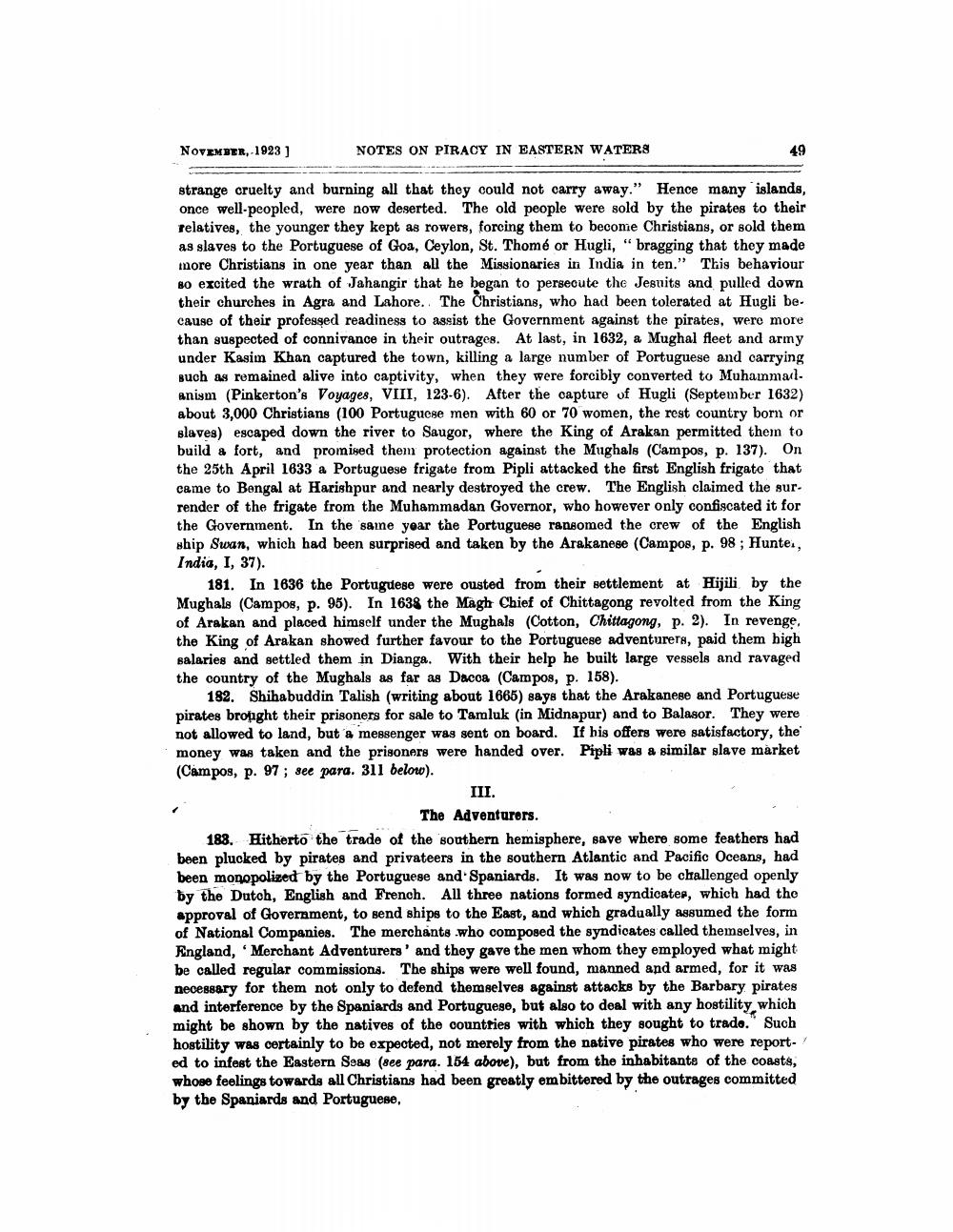________________
NOVEMBER, 1923)
NOTES ON PIRACY IN EASTERN WATERS
49
strange cruelty and burning all that they could not carry away." Hence many islands, once well-peopled, were now deserted. The old people were sold by the pirates to their relatives, the younger they kept as rowers, forcing them to become Christians, or sold them as slaves to the Portuguese of Goa, Ceylon, St. Thomé or Hugli," bragging that they made more Christians in one year than all the Missionaries in India in ten." This behaviour 80 excited the wrath of Jahangir that he began to persecute the Jesuits and pulled down their churches in Agra and Lahore. The Christians, who had been tolerated at Hugli be. cause of their professed readiness to assist the Government against the pirates, were more than suspected of connivance in their outrages. At last, in 1632, a Mughal fleet and army under Kasim Khan captured the town, killing a large number of Portuguese and carrying such as remained alive into captivity, when they were forcibly converted to Muhammail. anism (Pinkerton's Voyages, VIII, 123-6). After the capture of Hugli (September 1632) about 3,000 Christians (100 Portuguese men with 60 or 70 women, the rest country born or slaves) escaped down the river to Saugor, where the King of Arakan permitted them to build a fort, and promised them protection against the Mughals (Campos, p. 137). On the 25th April 1633 a Portuguese frigate from Pipli attacked the first English frigate that came to Bengal at Harishpur and nearly destroyed the crew. The English claimed the surrender of the frigate from the Muhammadan Governor, who however only confiscated it for the Government. In the same year the Portuguese ransomed the crew of the English ship Swan, which had been surprised and taken by the Arakanese (Campos, p. 98; Hunte, India, I, 37).
181. In 1636 the Portuguese were ousted from their settlement at Hijili by the Mughals (Campos, p. 95). In 1638 the Magh Chief of Chittagong revolted from the King of Arakan and placed himself under the Mughals (Cotton, Chittagong, p. 2). In revenge, the King of Arakan showed further favour to the Portuguese adventurera, paid them high salaries and settled them in Dianga. With their help he built large vessels and ravaged the country of the Mughals as far as Dacoa (Campos, p. 158).
182. Shihabuddin Talish (writing about 1665) says that the Arakanese and Portuguese pirates brought their prisoners for sale to Tamluk (in Midnapur) and to Balasor. They were not allowed to land, but a messenger was sent on board. If his offers were satisfactory, the money was taken and the prisoners were handed over. Pipli was a similar slave market (Campos, p. 97; see para. 311 below).
III.
The Adventurers. 188. Hitherto the trade of the southern hemisphere, save where some feathers had been plucked by pirates and privateers in the southern Atlantic and Pacific Oceans, had been monopolized by the Portuguese and Spaniards. It was now to be challenged openly by the Dutch, English and French. All three nations formed syndicater, which had the approval of Government, to send ships to the East, and which gradually assumed the form of National Companies. The merchants .who composed the syndicates called themselves, in England, Merchant Adventurers' and they gave the men whom they employed what might be called regular commissions. The ships were well found, manned and armed, for it was necessary for them not only to defend themselves against attacks by the Barbary pirates and interference by the Spaniards and Portuguese, but also to deal with any hostility which might be shown by the natives of the countries with which they sought to trado. Such hostility was certainly to be expected, not merely from the native pirates who were reported to infest the Eastern Seas (see para. 154 above), but from the inhabitants of the coasts, whose feelings towards all Christians had been greatly em bittered by the outrages committed by the Spaniards and Portuguese,




